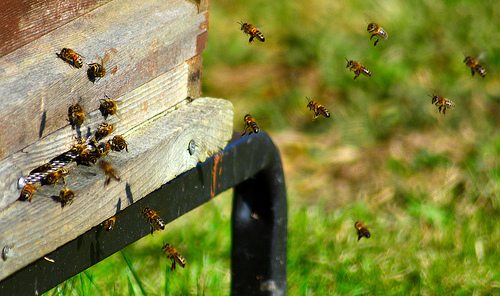

Environment
Bee death rate in US still ‘too high’ despite slight recovery
An annual survey on bee colony loss conducted by the US Department of Agriculture (USDA) has revealed that while fewer bees died in 2013/14 compared to the previous year, the mortality trend is still too high to ensure their long-term survival.
The loss of honeybee colonies in the US was 23.2% last year – down from 30.5% reported for the winter of 2012/13. The survey gives no explanation for the improvement.
However, it says that losses remain “above the level that beekeepers consider economically sustainable”.
US agriculture secretary Tom Vilsack commented, “While we are glad to see improvement this year, losses are still too high, and there is still much more work to be done to stabilise bee populations.”
The USDA blames queen failure, poor wintering conditions and varroa mites for the decline that American bees are experiencing. This is despite there being growing evidence that pesticides – neonicotinoids more specifically – are affecting pollinators.
A recent study led by Harvard University found that neonicotinoids were causing colony collapse disorder (CCD) in bees, affecting their immune system. Three of the most common neonicotinoids were banned in Europe in December but are still used in the US.
Lisa Archer, director of Friends of the Earth’s food and technology programme, said the findings demonstrated the need for action on pesticide use.
“While various factors are contributing to bee deaths, a strong and growing body of science tells us we must take action now to protect bees from neonicotinoid pesticides”, she said.
“Bayer, Syngenta and Monsanto make billions from bee-killing pesticide products while masquerading as champions of bee health. Are their profits more important than our food supply? Are they more important than the livelihoods of America’s farmers?”
Photo: Helene & Kev via flickr
Further reading:
EU ban on bee-harmful pesticides to begin in December
Loss of $200bn pollinating services will be harmful, scientists warn
Chemical giants did ‘furious lobbying against EU measures to save bees’
Banned pesticides highly likely to cause bee colony collapse, says Harvard study
Study: presence of bees ‘underestimated’ and improves value of crops


 Features11 months ago
Features11 months agoEco-Friendly Cryptocurrencies: Sustainable Investment Choices

 Energy11 months ago
Energy11 months agoThe Growing Role of Solar Panels in Ireland’s Energy Future

 Energy10 months ago
Energy10 months agoGrowth of Solar Power in Dublin: A Sustainable Revolution

 Energy10 months ago
Energy10 months agoRenewable Energy Adoption Can Combat Climate Change




























